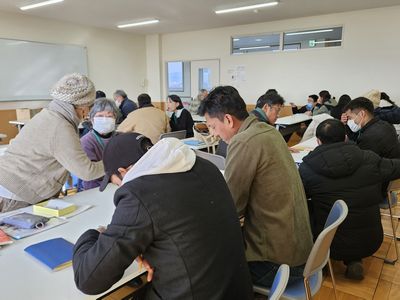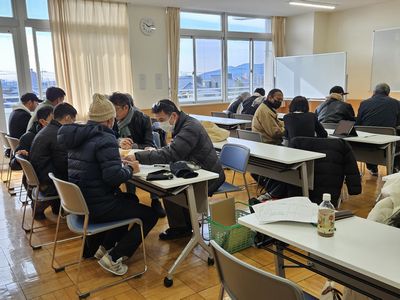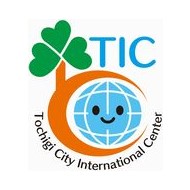トップページ
> とちぎ蔵の街自主夜間中学
> 第8回開催報告
2025.1.29
Report on the Eighth Activity(20250119)
Message from staffMurata Takashi
I am in charge of a junior high school class. It is difficult for foreign junior high school students to understand school lessons if they do not understand the Japanese language used to study the subject matter. They can easily master daily conversation if they attend school and make friends. However, most of the Japanese learning terms in science, social studies, and mathematics are written in kanji and are difficult to understand. When I explain them in their native language, they say, “Oh, I learned that in my home country. Therefore, they are shocked when their scores on school tests are far lower than their scores in their home countries. When it comes to the high school entrance exam, they cannot understand the exam questions themselves and cannot write passable answers even in English, which is at a higher level than for Japanese students.In this sense, I am convinced that the multilingual learning terminology dictionary that Dr. Tamaki has been working on for the past 10 years is an achievement that no one else could have made. As a volunteer, I have visited several junior high schools in Utsunomiya City to provide Japanese language support for daily conversation and as a subject study term. I had a particularly difficult time supporting third-year junior high school students who were preparing for high school entrance exams. However, I am very happy when I receive the news that they have been accepted to a prefectural high school. In the January 19 class, we helped the students with essay writing skills for the entrance examination. It is easy to write a good composition in one's native language, but when it comes to writing in Japanese, it can come out looking like an elementary school student's composition. It is a good idea to first think about sentence construction, try writing it in the native language, and then rewrite it in Japanese. Supporters should grind the Japanese written by the student into more understandable Japanese.
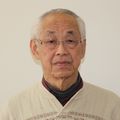 Murata takashi
Murata takashiIshikawa kaoru
This is my fourth time attending. I am usually in the elementary school students' classroom, but this time I had the opportunity to observe the working adults' classroom as well. The children are learning each subject in Japanese at school, so I thought it would be nice to have a place where they could relax and make up for it. I felt that if working adults could communicate well enough to live in Japan and enjoy the gap between Japan and their own country, they would be able to make their own lives better. I have learned every time I participate in this program that it is important to enjoy life as a human being, not as a country, because life is the same no matter which country you are in. Thank you for this wonderful opportunity.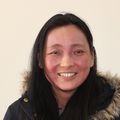 Ishikawa kaoru
Ishikawa kaoruHashimoto Mari
Hello. My name is Mari Hashimoto. I am from Oyama City. I worked as a nursery school teacher for a long time. I like to work with children, so I really enjoy the time I spend learning with elementary school students and many other people at this night school. I hope that I can provide not only learning but also fun time. Let's have fun and learn a lot at this night school for both adults and children! There is always something positive to be gained by coming, so please don't hesitate to join us!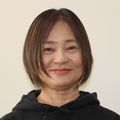 Hashimoto mari
Hashimoto mariMessage from Tamaki
Eighteen learners participated today. There were 11 working adults, 3 junior high school students, and 4 elementary school students. Compared to the last time, the number of working adults increased, while the number of elementary school students decreased. It is interesting to note that the number of participants changes from day to day. Among the working adults, only one is Japanese, and the rest are all participating for the purpose of learning Japanese. Some of them can hardly speak Japanese yet, and some cannot understand what they hear. The staff discusses various ways how we can support such people in learning Japanese.We are looking for both learners and staff to support learners! Learners can learn “anyone, anytime, forever” for free. Of course, those who live in cities and towns other than Tochigi City are also welcome. You do not need a teaching license, various qualifications, or experience to become a support staff member. Recently, I have strongly felt that this kind of place, where learners and support staff of various nationalities, ages, and backgrounds gather, is an enjoyable space where all participants can naturally express their own personalities. Please come and visit us first.
This is a personal matter, but I got a haircut at the end of last year. I don't often go to the barber because I prefer long hair, but I was in the mindset of “I should get a haircut before the New Year. On that day, a Japanese female learner asked me, “Why did you cut your hair?” and “Sensei looks better with long hair,” she suddenly said. What do your family members say? I answered that they said it looks nice and clean”, ”Really? The conversation continued. I hope that she will call me “Tamaki-san” instead of “Sensei,” but regardless, I am very happy that we are starting to have this kind of friendly conversation. An acquaintance I met last week in a while also told me that short hair does not suit to you very well, so I will not be going to the barber for the time being!
Held three times a month starting in April! We are currently meeting twice a month, but are in the process of discussing with our staff to make it happen three times a month starting in April. Basically, the first, third, and fourth Sundays. I think the learning effect will definitely increase, and the main reason is that we miss not seeing you for two weeks in the first place. Let's work together to create a place where we can enjoy learning and interacting with each other. The next activity will be on Sunday, February 2.
